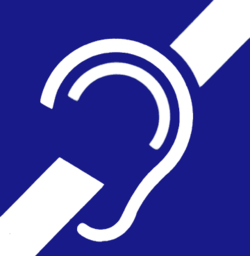This article needs to be updated.(September 2023) |
| International Week of the Deaf | |
|---|---|
 International Symbol for Deafness | |
| Also called | IWDeaf |
| Observed by | Worldwide |
| Duration | 1 week |
| Frequency | annual |
| Related to | International Day of Sign Languages (IDSL) |
International Week of the Deaf (IWDeaf) is celebrated annually across the world during the last full week of September since 2009. [1] [2] In 2018, it was celebrated together with the official International Day of Sign Languages, declared by the United Nations (UN), [3] for the first time.The World Federation of the Deaf (WFD), its national associations, and their affiliates all over the world observe International Week of the Deaf from Monday through Sunday, culminating in International Day of the Deaf on the final Sunday of the week. [4]
In order to commemorate International Week of the Deaf, the WFD invites its national associations and their affiliates to center their celebrations on the theme of Human Rights through Sign Languages. With this emphasis, deaf culture and the accomplishments of deaf people are highlighted more and are positively portrayed. This emphasis fosters better deaf people's rights advocacy activities and strengthens the bonds of solidarity between deaf people and those who support them. [4]
International Week of the Deaf is observed year-round in the United States, not just the last full week in September. For instance, the NAD participated in the Midwest DeaFest, which four state associations of the deaf jointly sponsored in August 2009. In celebration of the births of Thomas Hopkins Gallaudet (December 10, 1787) and Laurent Clerc (December 26, 1785) respectively, a library may host an exhibit in December. Affiliate organizations or other groups may also have Deaf Festivals on a specific day or month (such as April). [4]
Previous events held in the United States include performances by performing artists, seminars, exhibitions of art, film festivals, historical displays, Deaf Festivals, booths in nearby malls, and cultural activities held in conjunction with sporting events. [4]